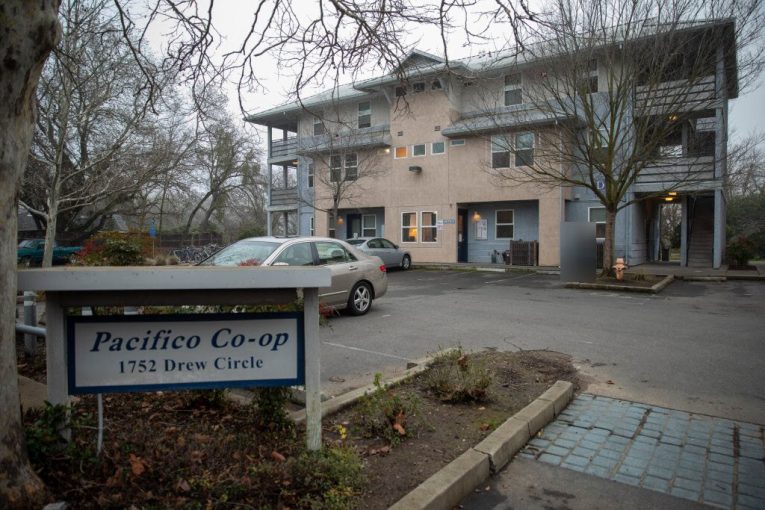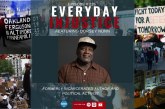

We have been hearing complaints about Pacifico since last fall. The neighbors got to the point where they requested (demanded?) the city level Pacifico and rebuild from scratch. The council has thus far opted to take the more modest step of calling for an RFP (Request for Proposal) where they would take proposals for re-purposing the Pacifico complex.
I do find it interesting, though, that Mutual Housing – one of the larger builders of Affordable Housing – is calling for the same thing, writing in an August 16 letter, “Mutual Housing believes that the most appropriate plan would be to demolish the existing structures and construct new and sustainable affordable housing.”
They argue: “The design of the existing Pacifico housing is not operationally viable. Even as affordable housing, the fact that its units include neither individual kitchens (or even kitchenettes) nor bathrooms make them very difficult to rent on a consistent basis.”
Given their history and credibility, we would be loathe to discount it – but I keep coming back to the issue at hand here. We have a population of at-risk people, who are facing homelessness, and now we are proposing to re-purpose the housing for something else.
Are the other proposed uses good? It seems like it. But unless there is a clear plan to find housing for the people at Pacifico, we are basically trading one group for another.
My question from the start has remained the same – if the situation is bad, why is it bad and how can we fix it? The neighbors’ solution has been to get rid of the problem, and the council, while on the one hand calling it “not really a viable solution,” seems to be doing exactly that.
Back in May when this came before council, Councilmember Will Arnold was willing to call out the neighbors to some extent.
To those who argued against the fence, he pointed out that he lived in a house with a fence “because I have a reasonable expectation of privacy where I live.”
He said, “The idea that we’re going to come out here and say fences aren’t necessary, these folks don’t deserve a fence, they shouldn’t have any privacy, I ought to be able to look in and see what  they’re doing because they’re a menace – that doesn’t fly with me.”
they’re doing because they’re a menace – that doesn’t fly with me.”
Will Arnold also noted that, while he can afford not to live in a place like Pacifico, and he lived in a place “not unlike Pacifico” in college in Eugene, “would I want to live in a place like that today? No.” “Did I think it was uninhabitable?” he asked, “just because it’s not the way you would want to live, doesn’t mean it’s uninhabitable.”
He said when he spoke to residents they said, while they aren’t that crazy about the configuration, their main concern is “they’re very happy to have a roof over their heads.”
He said one of his beefs with his tenure on the council is with “the hyperbole that gets used when what we’re trying to say (is) we can do better by folks… but instead we say it’s uninhabitable.”
Will Arnold said this is not a place that’s uninhabitable, but it is a place if you can afford not to, you might not want to live there.
Despite this, as I pointed out in May, it is not clear that the council’s ultimate solution is that much different from the proposals of the neighbors.
I am still not satisfied that the problems cited by the neighbors are population-based rather than based on management and location. So I think the first step before making changes should be to make that determination and exhaust administrative and management remedies.
Second, Pacifico is serving a population where there are clear needs. So the second question should be – if not here, where?
The answer to that cannot be Creekside and a host of other already planned affordable housing locations because, clearly, they were planning for those AND Pacifico, not those INSTEAD OF Pacifico.
This was a key point raised by both DA Jeff Reisig and Public Defender Tracie Olson in a May op-ed.
They wrote: “Before we can hope to address homelessness, we have to understand the people who experience it.”
They write: “Many people who are homeless struggle with mental illness, addiction or a chronic health issue. All, however, struggle with the stigma and social disgrace associated with their homelessness condition.”
As they point out: “The debate in Davis over the Pacifico complex is emblematic of conversations unfolding in communities throughout the state. With homelessness issues surging to the forefront statewide, finding solutions to the issues of mental health and addiction become increasingly urgent.”
The problem now is that by adhering to the wishes of the residents, the city council is now moving away from housing to help this target population. And the bigger problem is if the neighbors of Pacifico succeed in forcing out this population, the next group of neighbors will raise this as their point of objection to the next proposal.
How are we going to solve that? And yet here we go, we are already accepting RFPs for alternative designs without addressing the core issues of those living at the facility who will no longer have affordable living options.
Once again, no one really seems to care what happens to these populations – the neighbors simply want them away from their homes and out of Pacifico. The staff report for this week doesn’t address that issue. We will see what happens at the council meeting.
—David M. Greenwald reporting







Now… a fifth, pretty undefined, “proposal”, submitted well after the RFP submittal deadline…
OK… let’s consider all, timely, after asking all to sharpen their pencils and add meat to the proposals… financing, and ability to perform should be the main criteria to move any “football” forward.
Then, weed them out, one by one, weakest first.
I agree that any plan for Pacifico should include plans for accommodating/rehousing the existing residents. That should be addressed by the Council before approving any future use.
As to the recently added fence—let’s be honest. It had nothing to do with the residents’ privacy. (How many apartment-type complexes in town are surrounded by a solid 7-foot fence, let alone a fence that blocks the view of an idyllic, natural habitat?) This had everything to do with out of sight, out of mind. There’s little question that NIMBYism will return if the Council considers housing for any population that is deemed undesirable by local homeowners. Let’s hope that is not a deciding factor.
Clearly true.
As the local homeowners will. Local homeowners not being happy about a bad situation nearby — you can label it whatever you want in a vain attempt to put them down with an acronym — this is what people do: protect their families, their investments and their way of life. There is nothing ‘wrong’ with that — this ‘-ism’ label is human nature that applies to everyone — we protect our investments and those we love. One may argue if the threats are perceived or real — but to ignore threats is a form of insanity. And to put people down for doing what all human beings do, is nothing more than a vain political tool.
Alan – These are the same justifications historically used to keep racial minorities out of neighborhoods and is still used to discriminate against other groups, including people with mental, developmental, and other disabilities.
Oh, OK, that’s the only explanation . . . sure.
so, should we not have police? . . . as police are historically used to keep racial minorities out of neighborhoods and are still used to discriminate against other groups, including people with mental, developmental, and other disabilities. Or so I’ve heard . . . on this blog and elsewhere.
I think the city should exhaust their options with Pacifico before tearing it down. Or changing the current residents.